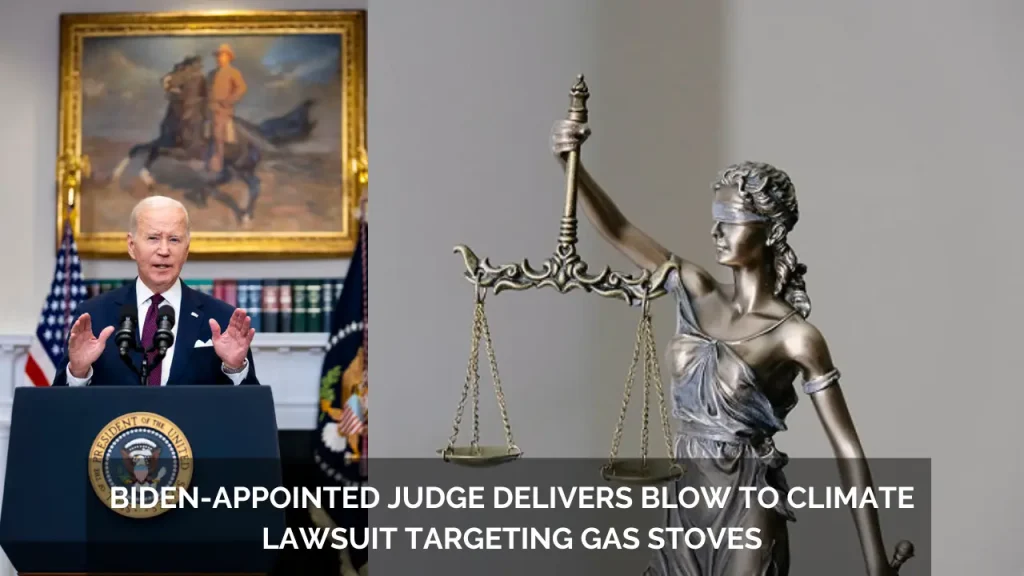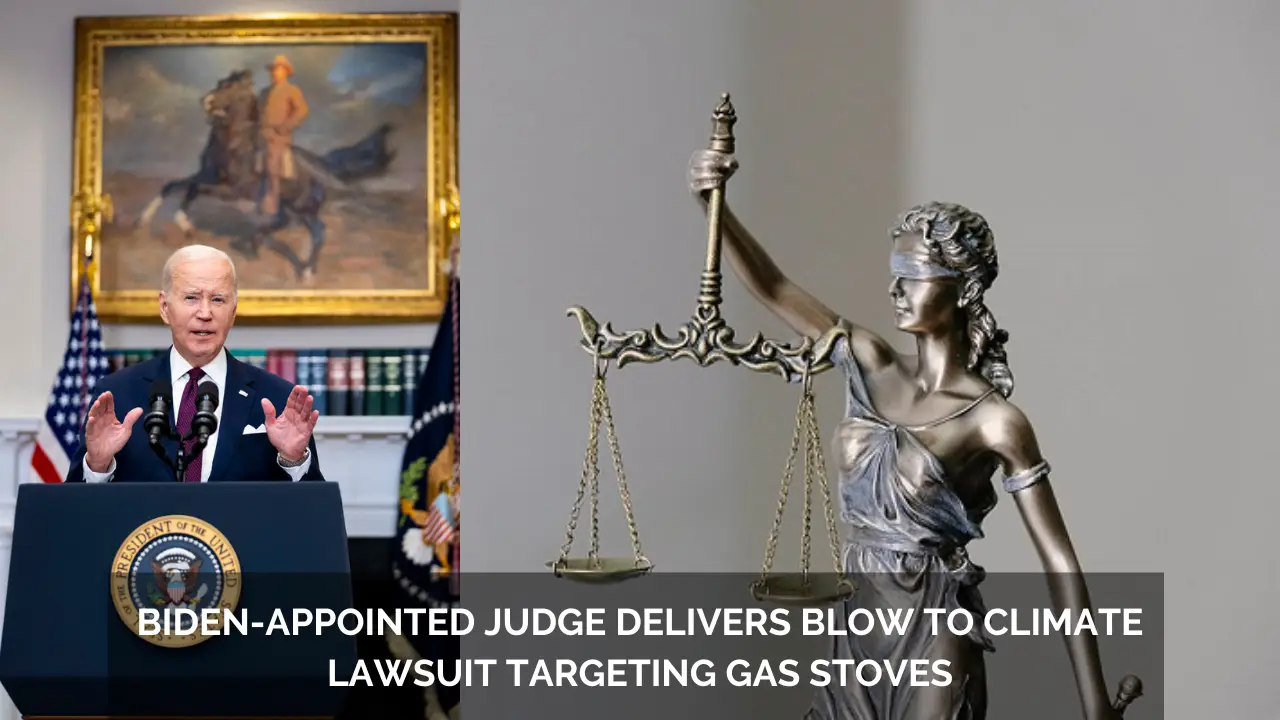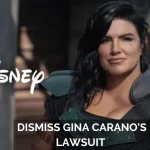Biden-Appointed Judge Delivers Blow to Climate Lawsuit Targeting Gas Stoves

A recent ruling by Judge Araceli Martínez-Olguín, appointed by President Biden, has significantly impacted a class-action lawsuit filed by Charles Drake against Haier Appliances, the parent company of GE Appliances.
Drake’s lawsuit alleged that the company committed fraud by promoting their gas stoves as safe despite the harmful emissions they produce.
Judge Martínez-Olguín’s decision is crucial within the context of ongoing debates over climate regulations and product safety.
The ruling reflects broader challenges faced by environmental advocates seeking stricter controls on gas-powered appliances.
Background of the Lawsuit
Initial Allegations
Charles Drake’s lawsuit accused Haier Appliances of fraud, claiming the company failed to disclose the harmful emissions from their gas stoves. Key points in the allegations include:
- Consumer Reports article and a 2022 study funded by the Rocky Mountain Institute were cited, highlighting health risks such as increased levels of nitrogen oxide.
- The complaint argued that Haier should have been aware of these risks and that their failure to disclose this information misled consumers about the safety of their products.
Drake contended that these emissions constituted a defect that Haier knowingly ignored, leading to consumer fraud.
Public Reaction
The lawsuit has garnered significant attention, with mixed reactions:
- Supporters argue that gas stoves pose serious health risks and that stricter regulations are needed.
- Industry groups and some consumer advocates have criticized the lawsuit, questioning the validity of the claims and the feasibility of imposing stricter regulations.
This case is part of a broader discussion on the environmental and health impacts of gas stoves.
Judge Martínez-Olguín’s Ruling
Details of the Decision
Judge Martínez-Olguín’s ruling primarily dismissed the lawsuit due to procedural shortcomings. The key issues highlighted were:
- Fraud by omission: Drake did not adequately demonstrate that Haier had a duty to disclose the emissions or that he relied on any concealment of this information.
- The judge noted that Drake’s general claim that Haier “should have known” about the emissions did not meet the legal standards required for fraud.
The ruling emphasized the need for specific and detailed allegations to support claims of fraud.
Remaining Claim
Despite dismissing most of the claims, the judge allowed one aspect to proceed:
- Implied warranty of merchantability: This claim suggests that Haier’s products were not fit for their intended use.
- Drake was given until March 14 to file an amended complaint, meaning part of the case is still active.
Implications of the Ruling
Impact on Climate Lawsuits
The ruling represents a setback for those advocating stricter regulations on gas stoves. It highlights:
- Challenges in proving fraud: Particularly in cases involving complex issues of product safety and environmental impact.
- The ruling may influence how future legal actions are framed and the type of evidence required to support such claims.
Regulatory Context
The decision is set against a backdrop of regulatory challenges:
- Biden administration’s stance: Initially pushing for stricter regulations but later backing off due to industry pushback and consumer concerns.
- This ruling adds complexity to the regulatory landscape for gas stoves, potentially affecting future regulations and industry responses.
Broader Context and Reactions
Environmental Advocates
The ruling impacts ongoing debates on the environmental effects of gas stoves:
- Federal appeals court decision: In January, a federal appeals court rejected a natural gas ban proposed by Berkeley, California.
- The Biden administration’s softened stance on regulations further complicates the regulatory environment.
Industry and Legal Perspectives
Responses to the ruling include:
- GE Appliances: Has declined to comment on the case due to its policy on pending litigation.
- Dovel & Luner: The law firm representing Drake has not responded to comment requests.
The ruling may influence future litigation and regulatory strategies related to environmental and health concerns.
Conclusion
In summary, Judge Araceli Martínez-Olguín’s ruling has significant implications for the ongoing legal and regulatory debates surrounding gas stoves.
The decision to largely dismiss Charles Drake’s lawsuit underscores the challenges of proving fraud in environmental cases.
As the case continues with the remaining claim, it will be important to monitor further developments and their potential impact on both litigation and regulatory approaches concerning the environmental and health impacts of consumer products.
Frequently Asked Questions
What was the main allegation in Charles Drake’s lawsuit against Haier Appliances?
Charles Drake alleged that Haier Appliances committed fraud by marketing their gas stoves as safe despite knowing about the harmful emissions they produce. He claimed that these emissions posed significant health risks and that Haier failed to disclose this information to consumers.
Who is Judge Araceli Martínez-Olguín and what is her role in this case?
Judge Araceli Martínez-Olguín, appointed by President Biden, is the federal judge who ruled on the lawsuit. Her role was to assess the validity of Drake’s claims against Haier Appliances and determine whether the case should proceed.
What were the key reasons behind Judge Martínez-Olguín’s decision to dismiss most of the claims?
The judge dismissed most of the claims because Drake did not meet the legal requirements for fraud by omission under California law. Specifically, Drake failed to show that Haier had a duty to disclose the emissions or that he relied on any alleged concealment of this information.
Which claim was not dismissed and what does it involve?
The only claim not dismissed was related to the implied warranty of merchantability. This claim suggests that Haier’s gas stoves were not fit for their intended use. The judge allowed Drake until March 14 to file an amended complaint related to this claim.
How did the public and legal community react to the lawsuit and the ruling?
Reactions were mixed. Supporters of stricter regulations on gas stoves argued that the ruling was a setback for environmental and health concerns. Industry groups and some critics questioned the validity of Drake’s claims and the feasibility of imposing tighter regulations.
What is the significance of this ruling in the context of climate and regulatory debates?
The ruling highlights the challenges environmental advocates face in proving fraud and addressing the health impacts of gas stoves. It also reflects broader regulatory challenges and shifting stances by the Biden administration on climate-related regulations.
What was the context behind the legal action taken by Charles Drake?
Charles Drake’s lawsuit was based on concerns that gas stoves emit harmful pollutants like nitrogen oxide, which have been linked to health issues. His legal action was part of a broader discussion on the environmental impact of gas appliances and regulatory responses.
What are the potential next steps for Charles Drake following the ruling?
Charles Drake has been given until March 14 to file an amended complaint related to the implied warranty of merchantability. The case is technically ongoing, and the outcome of this claim could influence future litigation and regulatory approaches.
How does this ruling fit into the broader regulatory landscape concerning gas stoves?
The ruling adds complexity to the regulatory landscape for gas stoves. It comes after the Biden administration’s decision to back off from more aggressive regulations targeting these appliances, influenced by industry pushback and public opinion.
What impact might this ruling have on future climate-related lawsuits and regulations?
The ruling may set a precedent for how fraud claims are handled in environmental lawsuits. It could influence how future cases are framed and the type of evidence required to support claims about the safety and environmental impact of consumer products.



No Comment! Be the first one.